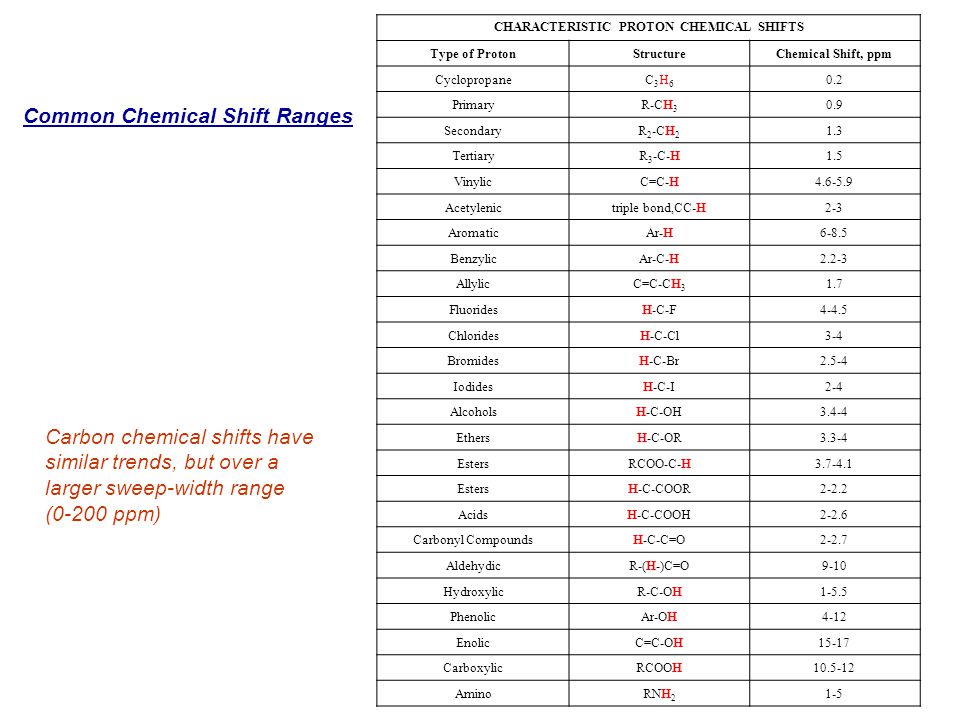Typical h nmr shift ranges.
Vinylic protons chemical shift.
Chemical shift is associated with the larmor frequency of a nuclear spin to its chemical environment.
This is a general trend add approximately 0 2 0 4 ppm for each additional alkyl group.
We ll consider the aromatic proton.
In other words frequencies for chemicals are measured for a 1 h or 13 c nucleus of a sample from the 1 h or 13 c resonance of tms.
1 h nmr chemical shifts.
Predict the chemical shifts of the protons in the following compounds.
C h acetylenic 2 3 ar h aromatic 6 8 5 ar c h benzylic 2 2 3 c c c h.
Splitting between vinylic protons in alkenes depends strongly on the geometrical relation.
Vinylic protons those directly bonded to an alkene carbon and aromatic benzylic protons are dramatic examples.
In other words frequencies for chemicals are measured for a 1 h or 13 c nucleus of a sample from the 1 h or 13 c resonance of tms.
1 h nmr chemical shifts.
Tetramethylsilan tms ch 3 4 si is generally used for standard to determine chemical shift of compounds.
The chemical shift of a vinylic proton is an average over all orientations of the molecule.
Chemical shift d type of proton examples chemical shift in ppm comments.
Type of proton type of compound chemical shift range ppm rc h 3 1 aliphatic 0 9 r 2 c h 2 2 aliphatic 1 3 r 3 c h 3 aliphatic 1 5 c c h vinylic 4 6 5 9 c c h vinylic conjugated 5 5 7 5 c.
Table 13 3 typical values of chemical shifts type of proton approximate 8 type of proton approximates 0 9 alkane ch methyl alkane ch methylene 1 7 1 3 c c ch ph h aromatic ph ch benzylic 7 2 alkane ch 1 4 23 mething le r c aldehyde 9 10 ch methyl ketone 2 1 2 5 cec h.
Some protons resonate much further downfield than can be accounted for simply by the deshielding effect of nearby electronegative atoms.
Chemical shift is associated with the larmor frequency of a nuclear spin to its chemical environment.
0 8 1 5 ppm alkane c h.
We know that a proton alpha to a carbonyl group is pulled downfield.
Table of characteristic proton nmr chemical shifts.
Notice that the proton closest to the carbonyl group is at a higher chemical shift than the proton in cyclohexene 6 05 ppm for cyclohexenone vs.
However this particular orientation makes such a large contribution that it dominates the chemical shift.
The chemical shifts of aromatic and vinylic protons.
And even though the signal can be in the range from 1 6 ppm it is usually in the downfield end of this spectrum.
The chemical shift of protons connected to heteroatoms the second group of protons giving signal in this region is the ones bonded to heteroatoms such as oxygen and nitrogen.
Tetramethylsilan tms ch 3 4 si is generally used for standard to determine chemical shift of compounds.

